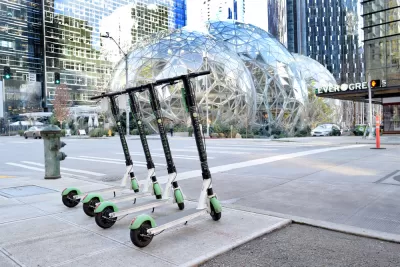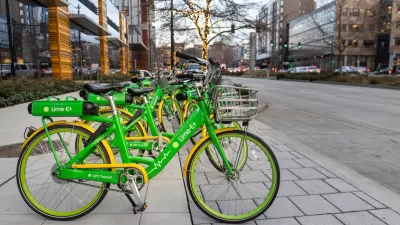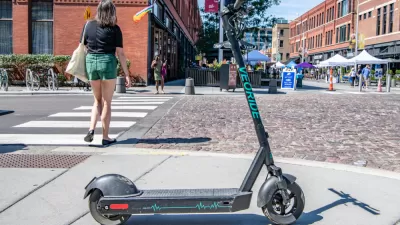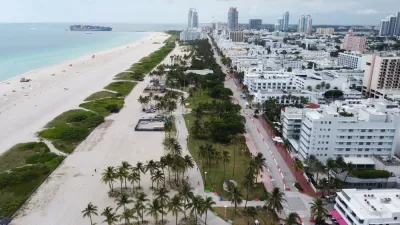The city’s shared e-scooter program has proved popular, seeing more than eight times as many rides as its bike share system.

Amanda Zhou reports on the success of Seattle’s electric scooter pilot program, which allowed four private companies to operate scooters in the city starting in September 2020. “Over 1.4 million trips were taken by 260,000 riders during the pilot program between September 2020 and October 2021, with the initial fleet size of around 1,500 colorful devices growing to 5,000 citywide, according to a report recently released by the Seattle Department of Transportation.”
Since the program’s launch, “the number of scooter trips has outpaced the number of rides taken using the city’s mixed fleet of pedal and electric bikes, according to SDOT. In September, Seattle saw just under 300,000 scooter trips compared to about 35,000 bike trips.” More than three quarters of riders used scooters for recreational purposes and errands, while almost a quarter said they used scooters as part of their commute. “About one-fifth of respondents said they used scooters to connect to transit and more than half said they would have used a personal vehicle or taxi if the scooters weren’t available.”
Some city council members expressed lingering concerns about the safety of the devices. “SDOT examined police reports and found 17 collisions, the vast majority of which occurred between a scooter and a vehicle. Five of those cases resulted in ‘serious’ injuries and one was fatal,” the article notes. But infrastructure plays a role, too: “Riders attributed factors like poor weather, road conditions like potholes and raised pavement, and interactions with other drivers.”
The report also highlights the success of the reduced-fare program, while acknowledging that not enough users seem to be aware of the program. “Reduced-fare scooter riders represent less than 1% of all riders but take about 4.5% of rides. Reduced-fare riders took an average of 64 trips per person compared to around three trips per rider overall.”
FULL STORY: What Seattle learned from one year of electric scooters

Alabama: Trump Terminates Settlements for Black Communities Harmed By Raw Sewage
Trump deemed the landmark civil rights agreement “illegal DEI and environmental justice policy.”

Planetizen Federal Action Tracker
A weekly monitor of how Trump’s orders and actions are impacting planners and planning in America.

Why Should We Subsidize Public Transportation?
Many public transit agencies face financial stress due to rising costs, declining fare revenue, and declining subsidies. Transit advocates must provide a strong business case for increasing public transit funding.

Understanding Road Diets
An explainer from Momentum highlights the advantages of reducing vehicle lanes in favor of more bike, transit, and pedestrian infrastructure.

New California Law Regulates Warehouse Pollution
A new law tightens building and emissions regulations for large distribution warehouses to mitigate air pollution and traffic in surrounding communities.

Phoenix Announces Opening Date for Light Rail Extension
The South Central extension will connect South Phoenix to downtown and other major hubs starting on June 7.
Urban Design for Planners 1: Software Tools
This six-course series explores essential urban design concepts using open source software and equips planners with the tools they need to participate fully in the urban design process.
Planning for Universal Design
Learn the tools for implementing Universal Design in planning regulations.
Caltrans
Smith Gee Studio
Institute for Housing and Urban Development Studies (IHS)
City of Grandview
Harvard GSD Executive Education
Toledo-Lucas County Plan Commissions
Salt Lake City
NYU Wagner Graduate School of Public Service





























